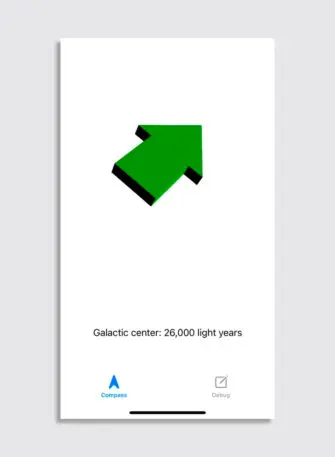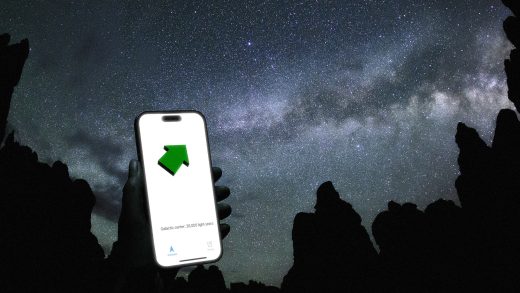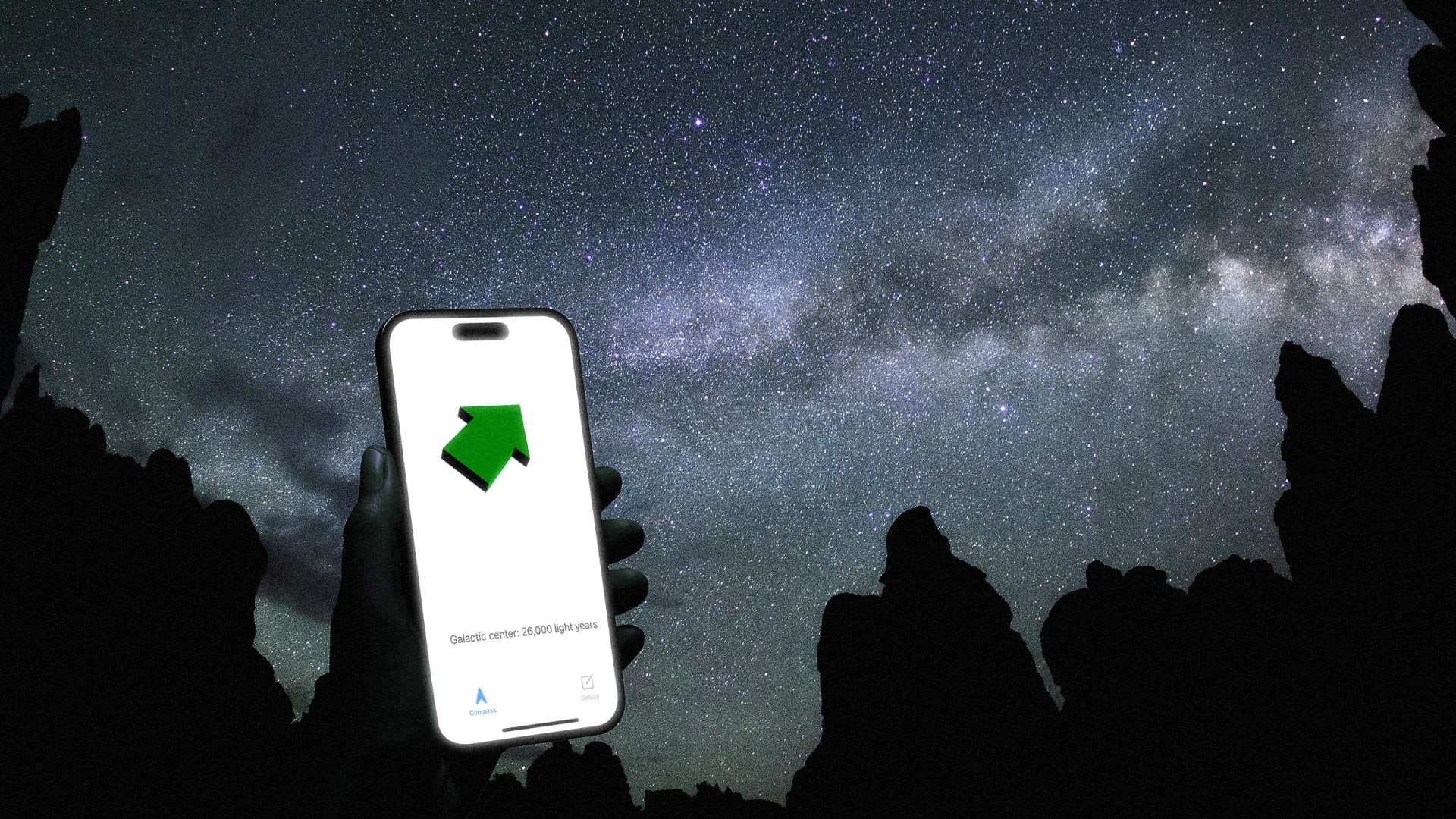The Galactic Compass is the best app for these dark times
The Galactic Compass is the best app for these dark times
Pointing at the center of galaxy, this humble arrow is a reminder of how insignificant and special humans are.
BY Jesus Diaz
How easy it is to forget how insignificant we are in the endless fog of our self-important human world. Embroiled in our pointless conflicts, drowning in tar pits made of emotions triggered by chemical reactions in a brain that we have yet to fully understand, we easily lose sight of who we are, of where we are, of what is really important in the seemingly infinite darkness of space and time that is our life.
Our existence matters to the eternal cosmos as much as a grain of salt in the bottom of the Mariana Trench matters to you while you sip your morning coffee reading this inconsequential post. The coffee that was made possible by a long chain of human beings who brought it to you from some forest in South America, each of them trying to stay afloat in their own stories of love and hate, joy and sorrow, happiness, and suffering. And yet, albeit lost in this nothingness, we all share the hope to find our way.
Well, guess what, my fellow homo sapiens: there’s an app for that, too.

It’s called Galactic Compass: a simple iOS utility that points at the center of our galaxy—the black hole known as Sagittarius A*—and tells you how far you are from it. “Once upon a time I trained myself to always know where to look, and the center of the galaxy moves, of course, over the day and the year,” explains Matt Webb in his blog announcing the app release. “Eventually then I had this picture of myself, and the Earth, and the solar system, and the center of the galaxy which had initially been whirling round me, and now it had flipped, I was turning around it.”
Webb, who invents products in his design practice Acts Not Facts, didn’t know how to code, so he got ChatGPT to help him program Galactic Compass and release it in the iPhone app store.
The user experience is as simple as it can get: a green 3D arrow floats in the center of your screen. Using the GPS in your phone, it knows where you are. With that information, it can use the iPhone’s circuitry to point to the center of the galaxy at any time of the day. You move your body following the arrow and, after a couple of seconds, you will be looking straight in the direction of the insignificant giant black hole (there are an estimated 40 quintillion black holes in the known universe) that ties our insignificant lives (8.1 billion humans and counting) to our insignificant planet (about 100 billion planets in our galaxy) orbiting our insignificant star (about 200 billion trillion stars in the universe).
You will only need to travel for roughly 26,000 years at 99.999% the speed of light to get there.
But there’s more than that. This simple green arrow is a beautiful reminder of what Carl Sagan called the “Great Demotions” in his book Pale Blue Dot. In that chapter, the astronomer went over the sequence of astronomical discoveries that put our species in the right place amongst the stars, going from thinking we were the center of existence to acknowledging that we are, well, almost nothing in the cosmic fabric.
“And if the lights in the sky rise and set around us, isn’t it evident that we’re at the center of the Universe? These celestial bodies—so clearly reveals that we are special. The Universe seems designed for human beings. It’s difficult to contemplate these circumstances without experiencing stirrings of pride and reassurance. The entire Universe, made for us! We must really be something,” Sagan wrote back in 1994. “This satisfying demonstration of our importance, buttressed by daily observations of the heavens, made the geocentrist conceit a transcultural truth—taught in the schools, built into the language, part and parcel of great literature and sacred scripture. Dissenters were discouraged, sometimes with torture and death. It is no wonder that for the vast bulk of human history, no one questioned it.”
Indeed, few questioned our place as the center of the universe until Copernicus discovered in the 16th century that there were other planets in our Solar System. That was our first demotion. And then Galileo shattered our fragile egos with the second demoting revelation: our Sun was not the center of the Creation. With each new scientific discovery, the dominoes fell one after the other until today, when we know for certain how unimportant we are in this vast cosmic arena.
Galactic Compass underlines this very same concept or, as Webb puts it, “once you can follow it, you start to see the galactic center as the true fixed point, and we’re the ones whizzing and spinning. There it remains, the supermassive black hole at the center of our galaxy, Sagittarius A*, steady as a rock, eternal. We go about our days; it’s always there.”
But, as you gaze at the solitary green arrow of the Galactic Compass, consider the impossible chain of events that has brought you to this moment in life, too. No matter how bad or good it may be for you right now, that green arrow is a reason to celebrate who we are, to realize, as Sagan said, how important it is to be kind and loving to each other. It’s a dizzying cosmic perspective, an awe inspiring yet perfectly grounding experience to have in the palm of your hand. The perfect reminder of how insignificant, special, and rare we are.
ABOUT THE AUTHOR
(11)



